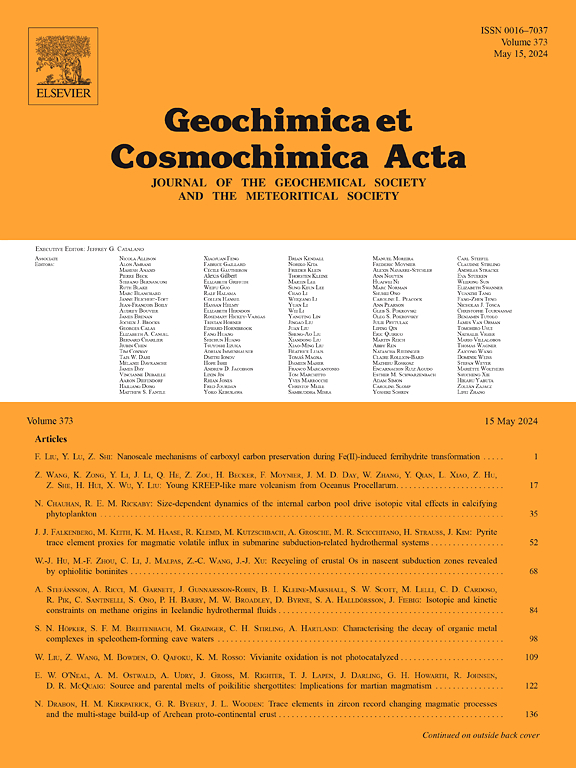Carbon and hydrogen isotope fractionation during aqueous diffusion of benzene
IF 5
1区 地球科学
Q1 GEOCHEMISTRY & GEOPHYSICS
引用次数: 0
Abstract
Compound-specific isotope analysis is widely used for evaluating the degradation of organic compounds in aquifers. We investigated the potential of aqueous diffusion of benzene under aquifer conditions (310 K, 70 bars) to cause significant isotope fractionation that might bias the estimates of biodegradation. Diffusion coefficients were computed using external field – non-equilibrium molecular dynamics simulations for benzene isotopologues with fictive masses to investigate the influence of molecular mass on aqueous diffusion. Our findings reveal variable power-law relations between molecular masses and diffusion coefficients depending on mass distribution, none of them being consistent with the kinetic theory often used to address isotopic effects on solute diffusion, even in dense solvents. Fictive isotopologues with mass substitutions not affecting the symmetry of the molecule consistently align with a power-law exponent βa = 0.038. In contrast, mass substitutions on a single atom within the benzene molecule (either hydrogen or carbon) result in a smaller mass dependency with βs = 0.021. This result implies that isotopically-labelled molecules such as perdeuterated benzene might not behave similarly to naturally-occurring mono-substituted molecules, an observation that is of importance for the use of these compounds in laboratory experiments. The resulting fractionation factor for mono-substituted benzene isotopologues is −0.3 ‰, and hardly contributes to the variations in benzene isotope composition under aquifer conditions, which validates the use of isotope ratios for evaluating biodegradation of organic compounds in aquifers.
苯水溶液扩散过程中碳、氢同位素分馏
化合物特异性同位素分析被广泛用于评价含水层中有机化合物的降解。我们研究了在含水层条件下(310 K, 70 bar)苯的水扩散可能导致显著的同位素分馏,这可能会影响生物降解的估计。采用外场非平衡分子动力学模拟方法计算了具有有效质量的苯同位素物的扩散系数,探讨了分子质量对其在水中扩散的影响。我们的发现揭示了分子质量和扩散系数之间随质量分布而变化的幂律关系,它们都不符合通常用于解决同位素对溶质扩散影响的动力学理论,即使在致密溶剂中也是如此。具有质量取代的假同位素不影响分子的对称性,其幂律指数βa = 0.038。相比之下,苯分子内单个原子(氢或碳)的质量取代导致较小的质量依赖,βs = 0.021。这一结果表明,同位素标记的分子,如过氘化苯,其行为可能与天然存在的单取代分子不同,这一观察结果对于在实验室实验中使用这些化合物具有重要意义。得到的单取代苯同位素分馏因子为- 0.3‰,几乎不影响含水层条件下苯同位素组成的变化,这验证了同位素比值用于评价含水层中有机物生物降解的有效性。
本文章由计算机程序翻译,如有差异,请以英文原文为准。
求助全文
约1分钟内获得全文
求助全文
来源期刊

Geochimica et Cosmochimica Acta
地学-地球化学与地球物理
CiteScore
9.60
自引率
14.00%
发文量
437
审稿时长
6 months
期刊介绍:
Geochimica et Cosmochimica Acta publishes research papers in a wide range of subjects in terrestrial geochemistry, meteoritics, and planetary geochemistry. The scope of the journal includes:
1). Physical chemistry of gases, aqueous solutions, glasses, and crystalline solids
2). Igneous and metamorphic petrology
3). Chemical processes in the atmosphere, hydrosphere, biosphere, and lithosphere of the Earth
4). Organic geochemistry
5). Isotope geochemistry
6). Meteoritics and meteorite impacts
7). Lunar science; and
8). Planetary geochemistry.
 求助内容:
求助内容: 应助结果提醒方式:
应助结果提醒方式:


